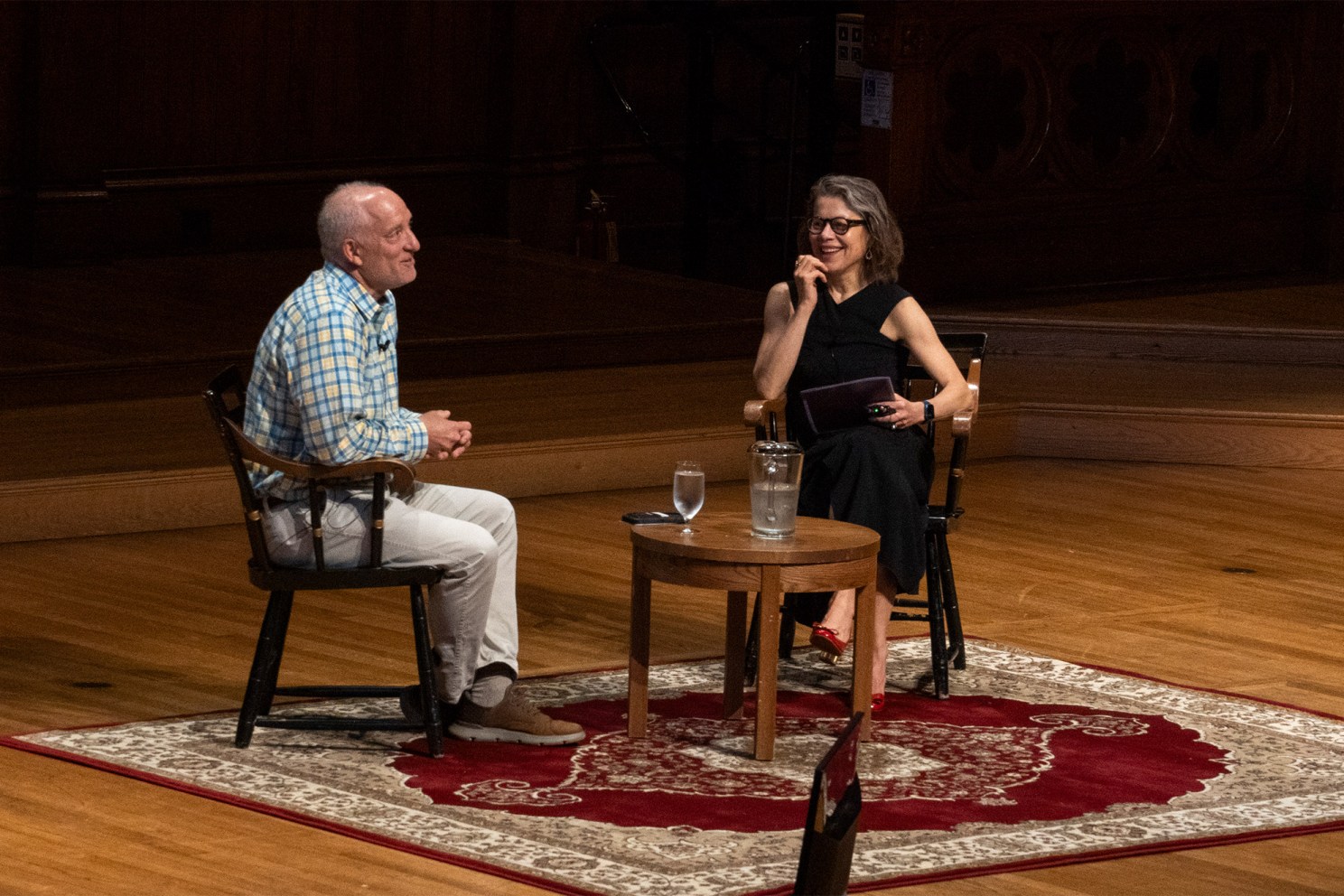
Michael D. Smith and Klara Jelinkova at the IT Summit.
Photo by Neal Adolph Akatsuka
IT Summit focuses on balancing AI challenges and opportunities
With the tech here to stay, Michael Smith says professors, students must become sophisticated users
Exploring the critical role of technology in advancing Harvard’s mission and the potential of generative AI to reshape the academic and operational landscape were the key topics discussed during University’s 12th annual IT Summit. Hosted by the CIO Council, the June 11 event attracted more than 1,000 Harvard IT professionals.
“Technology underpins every aspect of Harvard,” said Klara Jelinkova, vice president and University chief information officer, who opened the event by praising IT staff for their impact across the University.
That sentiment was echoed by keynote speaker Michael D. Smith, the John H. Finley Jr. Professor of Engineering and Applied Sciences and Harvard University Distinguished Service Professor, who described “people, physical spaces, and digital technologies” as three of the core pillars supporting Harvard’s programs.
In his address, “You, Me, and ChatGPT: Lessons and Predictions,” Smith explored the balance between the challenges and the opportunities of using generative AI tools. He pointed to an “explainability problem” in generative AI tools and how they can produce responses that sound convincing but lack transparent reasoning: “Is this answer correct, or does it just look good?” Smith also highlighted the challenges of user frustration due to bad prompts, “hallucinations,” and the risk of overreliance on AI for critical thinking, given its “eagerness” to answer questions.
In showcasing innovative coursework from students, Smith highlighted the transformative potential of “tutorbots,” or AI tools trained on course content that can offer students instant, around-the-clock assistance. AI is here to stay, Smith noted, so educators must prepare students for this future by ensuring they become sophisticated, effective users of the technology.
Asked by Jelinkova how IT staff can help students and faculty, Smith urged the audience to identify early adopters of new technologies to “understand better what it is they are trying to do” and support them through the “pain” of learning a new tool. Understanding these uses and fostering collaboration can accelerate adoption and “eventually propagate to the rest of the institution.”
The spirit of innovation and IT’s central role at Harvard continued throughout the day’s programming, which was organized into four pillars:
- Teaching, Learning, and Research Technology included sessions where instructors shared how they are currently experimenting with generative AI, from the Division of Continuing Education’s “Bot Club,” where instructors collaborate on AI-enhanced pedagogy, to the deployment of custom GPTs and chatbots at Harvard Business School.
- Innovation and the Future of Services included sessions onAI video experimentation, robotic process automation, ethical implementation of AI, and a showcase of the University’s latest AI Sandbox features.
- Infrastructure, Applications, and Operations featured a deep dive on the extraordinary effort to bring the new David Rubenstein Treehouse conference center to life, including testing new systems in a physical “sandbox” environment and deploying thousands of feet of network cabling.
- And the Skills, Competencies, and Strategies breakout sessions reflected on the evolving skillsets required by modern IT — from automation design to vendor management — and explored strategies for sustaining high-functioning, collaborative teams, including workforce agility and continuous learning.
Amid the excitement around innovation, the summit also explored the environmental impact of emerging technologies. In a session focused on Harvard’s leadership in IT sustainability — as part of its broader Sustainability Action Plan — presenters explored how even small individual actions, like crafting more effective prompts, can meaningfully reduce the processing demands of AI systems. As one panelist noted, “Harvard has embraced AI, and with that comes the responsibility to understand and thoughtfully assess its impact.”




